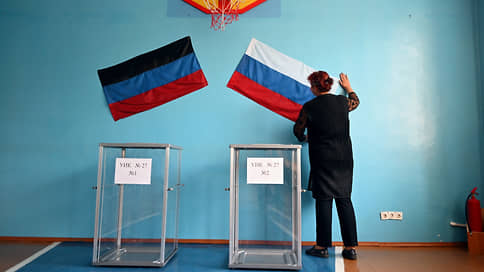The authorities of the new regions requested that elections be held on their territory on the Single Voting Day
[ad_1]

As it became known to Kommersant, the leaders of all four new regions, where the martial law regime is in force, turned to the Central Election Commission (CEC) with the initiative to hold elections on their territory on the autumn single voting day. In accordance with recent amendments to the electoral legislation, the answer to these appeals will be given after consultations between the CEC, the Ministry of Defense and the FSB. According to the experts of the Association “Independent Public Monitoring”, despite all the difficulties, the new subjects of the Russian Federation have good starting conditions for conducting election campaigns.
The fact that the heads of the Donetsk and Luhansk people’s republics, Kherson and Zaporozhye regions sent appeals to the CEC with an initiative to hold elections on September 10, 2023, Kommersant was told by several sources in the CEC and in one of these regions, and also confirmed by the deputy chairman of the Central Election Commission Nikolai Bulaev. According to one of Kommersant’s interlocutors, the results of consideration of these appeals will be made public only after consultations between the CEC and the Ministry of Defense.
Martial law in all new regions was introduced in October 2022 by decree of President Vladimir Putin. At that time, the federal constitutional law “On martial law” prohibited the holding of elections in regions where such a regime operates. At the same time, the constitutional laws approved in the same autumn on the admission of new subjects to the Russian Federation stated that the first elections to their legislative bodies and local governments should be held on the second Sunday of September 2023. In May, the State Duma eliminated this legal conflict by adopting amendments allowing elections to be held under martial law (both in the entire territory where it was introduced and in part of it) after consultations between the CEC, the Ministry of Defense and the FSB. The head of the region should initiate the start of the campaign, who, no earlier than 130 days and no later than 90 days before the voting day, sends an appropriate appeal to the CEC. This year, the unified voting day is scheduled for September 10, that is, the heads of the subjects could apply to the CEC no later than June 12.
Now, within five days from the date of receipt of applications, the CEC must hold consultations with the Ministry of Defense and the FSB, following which the commission will decide whether to call elections or reject the governor’s initiative. In addition, the CEC has the right to shorten the duration of the campaign, as well as to suspend electoral activities that have already begun, if the preparation and conduct of elections pose a threat to the life and health of citizens. After the dangerous circumstances are removed, the campaign can be resumed.
Meanwhile, experts of the Independent Public Monitoring Association (NOM) believe that, despite the objective difficulties, including passportization of the population and registration of voters, new regions have good starting conditions for conducting their election campaigns. This follows from the analytical report of the NOM, the presentation of which took place on June 13 at a round table in the Rossiya Segodnya news agency. Recall that at the beginning of 2023, the CEC decided not to publish information on the number of voters in the new subjects in connection with the martial law regime in force there.
“Despite the continuation of hostilities in certain parts of the territories of the new regions, this circumstance should not become a factor limiting electoral subjectivity,” the authors of the report believe. They also note that all five parliamentary parties have already announced their desire to participate in regional and municipal campaigns in the new territories. Therefore, in the upcoming elections “we can expect high competition against the backdrop of a revival of domestic political activity,” the document says.
The executive director of the NOM, Alena Bulgakova, speaking at the round table, expressed the hope that extraterritorial polling stations would be created in the autumn elections so that residents of new regions outside them could still take part in the vote. Such an opportunity appeared in the electoral legislation along with amendments to hold elections under martial law. As CEC Deputy Chairman Nikolai Bulaev explained earlier, the need to create such polling stations is due to the fact that the Mobile Voter mechanism, which allows citizens to vote outside their place of residence, works on the basis of the voter register and the State Services portal, and residents of new regions do not always have full details for entering their data into electronic systems. Ms. Bulgakova also believes that the legislation should clarify the list of documents that residents of the new territories can use when voting instead of a Russian passport.
In turn, political scientist Alexander Asafov, who also took part in the round table, noted that the inhabitants of the new regions have a great desire to participate in the big affairs of their country, and elections are a serious element of “big things”. Therefore, in his opinion, elections in the new regions, of course, should be held. The expert also considers it right to decide to hold parliamentary elections in new regions only according to party lists: this, in his opinion, will take into account all party diversity and force the parties themselves to more clearly express their positions and look for their voters.
[ad_2]
Source link








